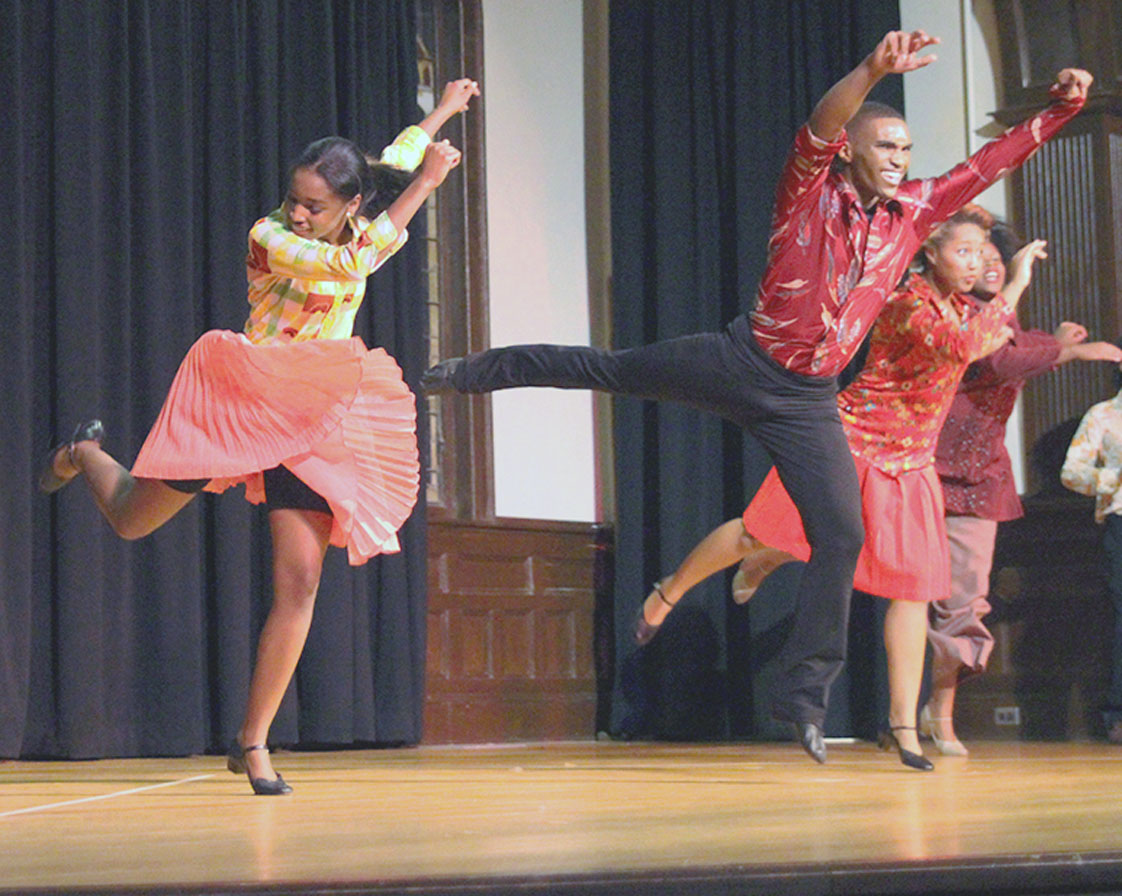
NCCU dancers (left to right) Darriell Palmer, Sheldon Mba and Kayln Smith perform “Don’t Bother Me, I Can’t Cope” at the Hayti Heritage Center, Oct. 23. The event was a production of the NCCU Department of Theatre.
(Staff photo by Alexandria Sampson)
Within one mile of each other stand two of Durham’s most historical sites.
Situated on Fayetteville Street near the Durham Expressway is what was formerly known as St. Joseph’s African Methodist Episcopal Church. Built in 1891, the church played an integral part in the thriving African-American community of Hayti.
In 1910, Dr. James E. Shepard – a visitor of the church and one of the founding fathers of the Hayti District – founded the National Religious Training School and Chautauqua in the neighborhood.
Now referred to as the Hayti Heritage Center and N.C. Central University, these two historic places have officially united.
In order to strengthen their cultural resources, NCCU’s College of Arts and Sciences has created a long-term partnership with the Hayti Heritage Center.
“It’s a rarity that you have two very important historical institutions in close proximity,” said Carlton Wilson, dean of the College of Arts and Sciences at NCCU.
The partnership’s first official event took place at the Hayti Heritage Center on Oct. 23. The program included student art exhibits, a performance of “Don’t Bother Me, I Can’t Cope” by the department of theatre and dance, a guitar duo by David Mills and Julia Price, and a vocal jazz ensemble featuring Helm-Hammonds and Arnold George.
Though the institutions have frequently interacted in the past, they didn’t have an established relationship. Wilson said the College hopes to formalize that bond.
“I think this is a natural partnership we can promote,” Wilson said.
The beginning of the collaboration began this summer when Community Director for the College of Arts and Sciences, Lenora Helm-Hammonds, approached Angela Lee, executive director of St. Joseph’s Historic Foundation.
Helm-Hammonds said the lack of visibility the College had outside of campus is what encouraged her to pursue a partnership.
“We have an amazing art program that nobody knows about outside of NCCU,” Helm-Hammonds said.
Once the first step was taken, Helm-Hammonds started to approach professors in the College. She said she was stunned to learn just how many had worked with the Center.
“Everybody was already doing things but they weren’t connected under one umbrella.”
The mutual goal of the collaboration is to reach out to all of the Durham community which is more challenging when done individually.
Helm-Hammonds said while the community may be unaware of the services provided on campus, those at NCCU may also be unknowledgeable about the Center.
This is an issue the partnership seeks to alleviate.
“It’s that old African principle of networking,” Helm-Hammonds said. “It’s not what you can do for me but what I can do for you.”
Helm-Hammonds said Hayti Heritage Center also acts as an important segway for art students. Those within the art profession are typically told they can’t get a solid job. In showcasing their art at the center and working in the office spaces, they’ll be able to achieve entrepreneurial and professional experience.
Nellie Riley, a Board Member for SJHF, also underscored the need for student participation in the Center.
With three full-time and two part-time workers, staff is limited. Riley said internships will be of great help to the center.
“Being a nonprofit service, we need to continue to have programs and staff bringing in resources,” Riley said.
In bringing in NCCU’s influence, Riley said she hopes the partnership will expand the impact on the community.
Above all else, though, the preservation of black history is the epicenter.
Riley made note that many people from “Black Wall Street” frequented the church. The church not only served as a religious center but was a place where blacks came for information.
Riley said it’s imperative that black history isn’t lost.
“We also like to be sure that the larger community be exposed to and appreciate the work and contributions of the African-American community without losing why we exist,” Riley said.